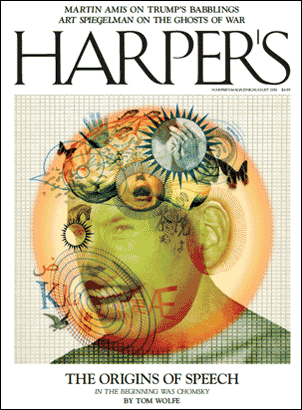Inside the August Issue
Martin Amis on the rise of Trump, Tom Wolfe on the origins of speech, Art Spiegelman on Si Lewen, fiction by Diane Williams, and more
 In this month’s cover story, Tom Wolfe attacks the charismatic cult of Noam Chomsky and the long reign of his theory that human beings are born with an innate ability to acquire languages. “It no longer mattered whether one agreed with Noam Chomsky’s scholarly or political opinions or not,” writes Wolfe, “for fame enveloped him like a golden armature.” For thirty years Chomsky had insisted that some empiricist would come along and prove him right. But in 2005, Daniel L. Everett published a paper that didn’t so much refute Chomsky’s conception of a language organ as dismiss it entirely. Wolfe tells the story of the man who proved Chomsky wrong, precipitating the great linguist’s fall from his “plateau on Olympus.”
In this month’s cover story, Tom Wolfe attacks the charismatic cult of Noam Chomsky and the long reign of his theory that human beings are born with an innate ability to acquire languages. “It no longer mattered whether one agreed with Noam Chomsky’s scholarly or political opinions or not,” writes Wolfe, “for fame enveloped him like a golden armature.” For thirty years Chomsky had insisted that some empiricist would come along and prove him right. But in 2005, Daniel L. Everett published a paper that didn’t so much refute Chomsky’s conception of a language organ as dismiss it entirely. Wolfe tells the story of the man who proved Chomsky wrong, precipitating the great linguist’s fall from his “plateau on Olympus.”
But as Walter Kirn reflects in this month’s Easy Chair, some experts are best left alone. At a cocktail party with a highly skilled surgeon, Kirn learns how patient-satisfaction surveys sometimes prevent doctors from providing the best possible care. According to Kirn, “the customer is always right, even if the customer is stupid or addicted to prescription narcotics” might well sum up what happens when insurance benefits are linked to ratings, but it’s also the great lesson of this year’s election season. In an era of aggregated content, “the spoils have a way of flowing to the middlemen.” No wonder, he writes, that the most outrageous political populist “is just another billionaire businessman, a man whose chief qualification seems to be that he lacks the technocrat’s competence and expertise.”
Martin Amis affirms Kirn’s disappointment with the “horizontal, spreading expanse of averaged cultural mulch” in his aghast review of two books “by” Donald Trump: The Art of the Deal (1987) and Crippled America (2015). Devoid of content or style, Trump’s bloated, distracted rages-to-riches stories “from which the rags have been tastefully excised” read like the “naked manifestations of advanced paranoia.” “We remember the bitter witticism about democracy,” Amis writes, “The people have spoken. The bastards.” But we cannot “let Trump be Trump,” he warns, lamenting the necessity, and urgency, of such obvious advice.
In his Miscellany on archery, Reeves Wiedeman meets Olympic athletes who, rather unlike Trump, devote years of their lives to accuracy and precision. Archery is in the middle of an unprecedented boom, and getting pretty good, Wiedeman discovers, is not too hard. (The actress Geena Davis almost qualified for the 2000 Games.) Getting great, however, is terribly difficult; the tension between body and mind is such that, during a competition, even an elite archer is liable to lose the feeling in her arms. All the drama is in an archer’s head, Weideman writes, which makes this a uniquely a tough sell as a spectator sport. As one archery buff put it, “even parents will tell you that after fifty arrows, they’re falling asleep.”
Also in this issue: Art Spiegelman pens an appreciation of Si Lewen’s Parade; Christine Smallwood reviews A.S. Byatt’s Peacock & Vine: On William Morris and Mariano Fortuny, Jamie James’s The Glamour of Strangeness: Artists and the Last Age of the Exotic, and Alfred Döblin’s Bright Magic: Stories; and Michael Wood contemplates the unlikely return of the Brat Pack.


